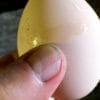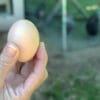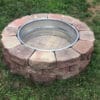Did you know that a chicken egg is wet when it’s laid? The dampness dries within seconds and forms a protective barrier around the egg called the “cuticle” (or “bloom”).
Chicken eggs are very porous and therefore susceptible to harmful bacteria. The bloom creates a protective seal that keeps out bacteria and also reduces moisture loss from the egg.
Of course, the bloom is intended to protect an unborn chick, should the egg become fertilized. But the bloom benefits people, too.
Longer Shelf Life
Eggs that are unwashed and have the bloom intact will keep much longer. If fact, you can store them at room temperature — for instance on your kitchen counter — for up to two weeks after they are laid. If you do refrigerate them, your eggs will keep for a couple of months.
Eggs with the bloom intact can then be washed just prior to consuming.
Now, what we’ve been talking about here are eggs from a backyard chicken flock. The eggs you buy at your local market are much different.
Store-Bought Eggs Are Different
Eggs you buy at the store have been cleaned. The United States Department of Agriculture (USDA) requires commercial egg producers to wash and sanitize eggs, then thoroughly dry them. So, by the time they reach the store the protective bloom is long gone.
With the bloom washed away, the porous egg shell is now susceptible to bacteria. As a result, commercially-produced eggs must be kept refrigerated to prevent the growth of any bacteria that may have found its way into the egg carton.
Washing Not Allowed In The EU
It’s interesting to note that selling washed eggs is actually illegal in the European Union (EU). Agriculture law in the EU specifically prohibits washing or other cleaning of “Class A” eggs sold in supermarkets.
Th EU’s position is that careless washing procedures can lead to more harm than good.








